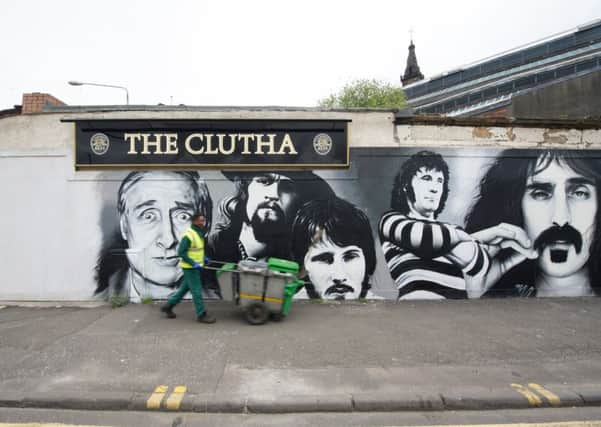Martyn McLaughlin: The Clutha is rising again


This spirit of endurance exerts a nourishing authority. While tracts of quayside are stippled by the brushed steel and sheer glass of conference centres and business parks – modular cathedrals sustaining the hope of a bright new economic dawn – it is in the obscured nooks between them that a few hardy architectural perennials impart a rich social history still being written.
One such building can be found at 167 Stockwell Street. For nearly two centuries, the stubby single-storey structure has been a pub, the second-oldest in the city, a stalwart where generations have gathered to take pause and a restorative half. The address has gone by many names over the years, from the Merchant and the Popinjay to the Weeman’s. It is best known by its current guise – the Clutha.
Advertisement
Hide AdAdvertisement
Hide AdWhen the first pint was pulled there in 1819 by landlord John McSymon, the second city of the Empire was on the cusp of its golden age. Only seven years before, a formidable four decade-long engineering venture known as the Lang Dyke had reached completion. The Clyde, its riverbed newly deepened, welcomed ever larger fleets up the Broomielaw, and with them a plentiful supply of punters eager to slake their thirst. By the 1870s, with the howff under the ownership of the Conway family, it was a haunt for the workers of the nearby Briggait fishmarket. Come the turn of the century, when it was known as McLaughlin’s, it was the first – and sometimes only – port of call for those departing the dozen or so squat passenger steamers puttering back and forward along the three-mile stretch of water to Whiteinch.
Other memories have been lost to the tide. Some more recent might never recede. For many Glaswegians, the very mention of the Clutha invites an incongruous emotional response, where once it was always viewed as a place of cheer, an old ramshackle friend waiting just beyond the northern anchorage of Victoria Bridge.
I first visited as a callow undergraduate, eager to drink in its history as much as whatever was on tap. Like the nearby Scotia, it was a bar that granted newcomers to the city a shortcut to its abundant musical, literary and political traditions. I returned sporadically over the following years. Each visit revealed how its hold grew stronger on a Glasgow that was slowly and inexorably fading away.
I still remember a chino-wearing tourist from the nearby Holiday Inn peering through the door like Lord Carnarvon setting foot in Tutankhamun’s tomb, anxious that curiosity might prove his undoing. Drawn in by the persistent lore, he had his own tales to share. A former sound engineer with unprintable Alex Harvey anecdotes, he left swaying gently, fortified by new friends and old malts.
They are unexceptional reminiscences, but they feel gilded of late, rendered all the more acute in light of the calamity that superseded them when, on the evening of 29 November 2013, a helicopter dropped from the sky through the roof, killing the pilot, two police officers on board and seven customers among the Friday night throng.
In the storied life of this historic pub, 18 months is a blip, but it has felt achingly prolonged. The unwonted circumstances which allowed tragedy to intrude upon the Clutha have yet to be fully explicated by the Air Accidents Investigation Branch. In the meantime, the pub has lost others dear to it, such as Geordie Madden, a grandfather of six who was a pillar of strength to those engulfed by grief.
Yet the Clutha will survive. This month, its owner, Alan Crossan, hopes to reopen the bar. The venture, the result of considerable soul searching and hard graft, has been a privilege and a burden. Many people have backed Crossan in his journey towards recovery; others felt nothing, least of all mortar, could salve gaping wounds. The Clutha, they reasoned, could not and should not start over.
A dutiful guardian, Crossan has listened with patience and respect, making a decision designed to give closure to everyone. The new Clutha will be no replica seeking to recapture the irreplaceable; its layout has changed, with tracts of its cavernous interior – including the crash site – closed off. In time, talk will turn to a permanent memorial to those who lost their lives. This month marks the first step in a delicate journey where the patrons will be Crossan’s guide. “The Clutha was never about the building,” he says. “It’s about the people.”
Advertisement
Hide AdAdvertisement
Hide AdIt is a maxim ably demonstrated by events over the past year and a half. Even without a berth, the Clutha’s indomitable spirit has tethered it closer than ever before to the city and its people: a trust established to bridge the gap between poverty and the arts has provided countless young musicians with lessons and tuition through its Guitars4Life initiative; members of the public have provided instruments.
Families of the victims have donated to the cause; the father of one, Gary Arthur, dropped by in the middle of construction work to pass on a simple blessing: let the music play again, he told Crossan. Privately, those who endured the greatest losses have given the most.
The homecoming is now in sight. Soon the Clyde will have an old confidant back by her side. 167 Stockwell Street has witnessed many changes over the years. The steamers have broken up and the merchant ships no longer drop anchor.
Inside, some well-kent faces will be conspicuous by their absence but their character remains. The grip tightens. The river flows.